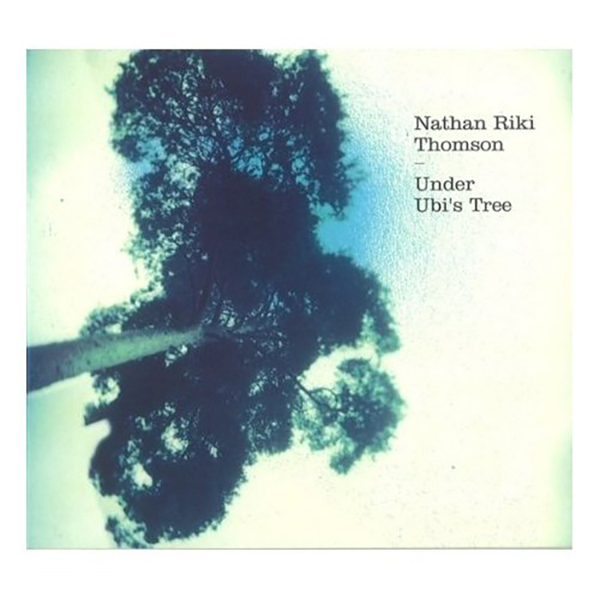
by Ian Mann
January 26, 2009
/ ALBUM
Quietly melodic "world jazz". Thomson has created a very personal sound world and the resultant album exudes considerable warmth and charm
Nathan Riki Thomson is an Australian double bass player,composer and educator now based in London. He has travelled widely and lived for five years in Africa (mainly in Tanzania) where he learned to play various indigenous instruments such as the filimbi (flute) and ilimba (a form of thumb piano) under the tutelage of Hukwe Zawose.
His love of Africa forms the inspiration for this album. The title is derived from Zawose’s father Ubi, who habitually sat under the tree in question. In turn the tree provided a backdrop for music making and dancing.
Thomson plays the filimbi and ilimba plus various other ethnic instruments on this recording and he is joined in a core trio by multi instrumentalist Simon Allen and percussionist Adriano Adewale. Thomson recently appeared on Adewale’s excellent album “Sementes” which is also reviewed on this site. It was here that his (Thomson’s) playing first came to my attention. There are also a number of guest appearances including a cameo from the brilliant guitarist Antonio Forcione, a long term associate of Thomson and Adewale.
The music on “Ubi’s Tree” is a kind of melodic world jazz in the tradition of Don Cherry, Collin Walcott and Oregon. The opening “Shikamoo Zawose” features Cassius Mlewa Mangaga on vocals and a forest of percussion. It is unmistakably African.
The lively"Bus To Bagamoyo” is led by Thomson’s powerful bass undertow and introduces another ethnic flavour in the form of Jan Hendrickse’s Arabic ney. Adewale’s percussion shimmers and crackles and he also makes use of the Brazilian berimbau and voice. Adewale was born in Brazil of African roots and has drawn great inspiration as a musician through his explorations of his African heritage.
“Waiting For Rain” is a dedication to the people of Zimbabwe. Thomson features on both bass and mbira (another type of thumb piano) with further rhythmic impetus provided by Allen and Adewale.
The use of western elements adds a melancholy air to parts of the piece courtesy of Jenny Adejayan’s cello, Marit Lyngra’s violin and John K.Miles’ bass flute. This is topped off by the haunting wordless vocal of Thomson’s Finnish born wife Katja.
“For Johanna” is another dedication, this time to Katja Johanna Thomson. This features Forcione’s delicate acoustic guitar against the backdrop of Thomson’s low register bass, Allen’s concertina and the atmospheric percussive effects of Allen and Adewale. Like it’s predecessor it’s strangely beautiful.
A trio of such pieces is completed by the shimmering “Ilalla” which features the lead vocal of Nia Lynn, Adejayan’s cello and Katja Thomson on viola and voice. Nathan supports on bass and also makes atmospheric contributions on filimbi, litungu and the Finnish kantele.
“Interlude” is a brief feature for Thomson’s deeply resonant bass in the company of Allen on kit drums and Adewale on percussion.
“Cheza” takes it’s title from the Swahili word for “dance” or “play” and features another distinctive contribution from Forcione’s guitar along side Thomson’s high register bass. Flutes and strings also find their way into a beguiling mix.
The title track is based on a traditional Tanzanian and eschews Western instrumentation. Cassius Mlewa Maganga’ voice and percussion are at the heart of the music supported by additional percussion from Adewale and the complementary low and high filimbis of Hendrickse and Thomson. Along with the opener it is the most overtly “African” track on the record.
“Hello Porcupine” is based around the melodic qualities of Thomson’s bass and he also overdubs himself on Masai flute. Adewale and Allen shimmer around him atmospherically on assorted percussion.
The Masai flute also features on the closing “Song For Otso”, a dedication to Thomson’s young son.
Centred around a double bass improvisation the piece also features the delicate sounds of hammered dulcimer and cimbalom both played by Allen. Thomson’s kalimba and Katja’s wordless vocal are also woven into the tapestry of this charming final chapter.
Thomson’s music successfully combines elements of the African and European traditions and also blends ancient with modern as traditional African instruments meet state of the art record production (by Allen) and overdubbing. The latter has enabled Thomson to craft elaborate arrangements on a number of tracks and to deploy an impressive range of instrumental colours.
“Under Ubi’s Tree” may not have the melodic flair and joie de vivre of Adewale’s “Sementes” but in fairness Thomson is looking to achieve a different kind of atmosphere. More reflective and considered Thomson’s album is clearly a labour of love which works it’s magic quietly. It’s the kind of record that takes a few listens to genuinely appreciate but is none the worse for that.
Thomson has created a very personal sound world and the resultant album exudes considerable warmth and charm.
The album will be launched on February 2nd 2009 at the Pizza Express Jazz Club, Dean Street, Soho, London W1 with a line up featuring Thomson, Allen, Adewale and Hendrickse plus guests Forcione, Miles, Adejayan and Lynn. Tickets £18.00 Show time 7.30 p.m.
See http://www.nathanthomson.net
blog comments powered by Disqus